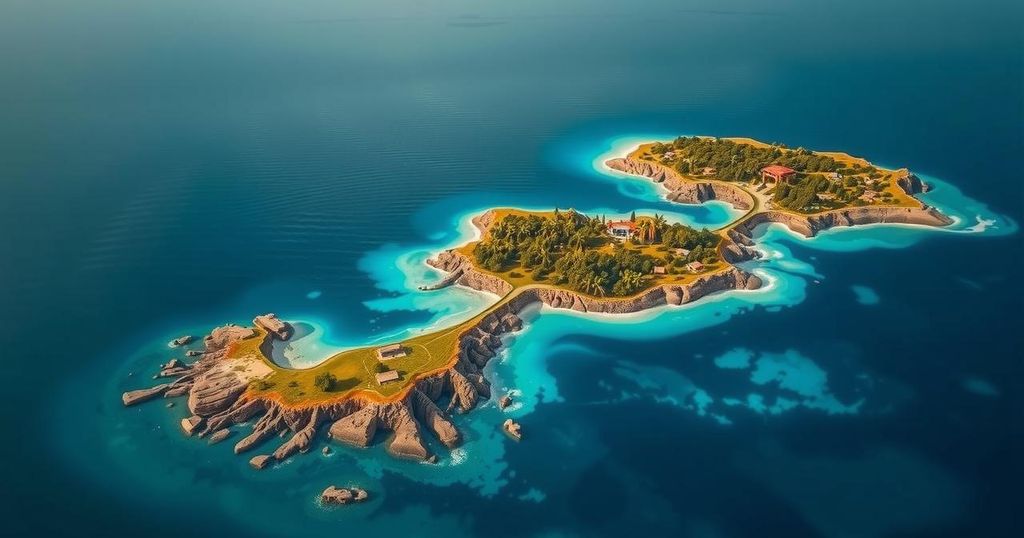Azerbaijani President Ilham Aliyev criticized French and Dutch colonialism’s impact on island territories vulnerable to climate change during a UN climate conference. His remarks sparked outrage, particularly from France and the Netherlands. Aliyev highlighted environmental damage from nuclear testing and human rights violations in New Caledonia, insisting that colonial neglect exacerbates the plight of these regions. The diplomatic fallout resulted in France’s withdrawal from the conference, showcasing the sensitivities surrounding these issues.
Last Wednesday, Azerbaijani President Ilham Aliyev voiced his concerns regarding the adverse impacts of climate change on island territories currently under French and Dutch control during a meeting at the UN Baku Climate Conference. His remarks specifically targeted the colonial policies that have perpetuated the vulnerabilities of these small island states. Aliyev’s statements ignited a backlash from France and the Netherlands, which have been slow to dismantle their neo-colonial administration of overseas territories. During his address, President Aliyev drew attention to the significant threats posed by climate change to archipelagos, citing rising sea levels and extreme weather patterns as severe challenges. Furthermore, he highlighted the negligence experienced by these island populations by administrative bodies situated in mainland countries. The President asserted, “Archipelagos face serious threats from rising sea levels, extreme weather events, and loss of biodiversity. Administrative authorities, often centered in mainland cities, unfairly neglect the needs of island populations.” He specifically condemned France for its nuclear testing in Polynesia, asserting that these actions have resulted in extensive environmental degradation, including contamination of water and soil. Between 1966 and 1999, France conducted 193 nuclear tests in the Pacific, inflicting considerable harm on local ecosystems. Additionally, Aliyev called out France’s colonial legacy in Algeria and ongoing human rights violations in regions like New Caledonia. In his critique, Aliyev referenced the deaths and injuries sustained during recent protests in French territories, claiming that the indigenous Kanak community experienced brutal crackdowns. Further, he expressed disbelief at the lack of condemnation from European institutions regarding France’s handling of dissent. He stated, “What else can we expect from the European Parliament and the General Assembly of the Council of Europe when the EU’s top diplomat calls Europe a garden and the rest of the world a jungle?” The diplomatic ramifications of Aliyev’s remarks led France to withdraw its Minister of the Environment from the Baku conference, whereas the Dutch government firmly rejected Aliyev’s accusations, deeming them unfounded. The reactions underscore the deep sensitivities surrounding discussions of colonialism and environmental responsibility, as well as the complexities of international diplomacy in addressing climate change.
The discussions at the UN Baku Climate Conference brought to light the intersection of climate change and colonialism, emphasizing the plight of small island states that remain under colonial rule. These territories experience significant vulnerability to environmental changes, yet face systemic neglect from their governing nations. President Aliyev’s remarks highlighted the need for accountability and decolonization, stressing how historical injustices exacerbate current ecological crises.
President Aliyev’s comments at the UN Baku Climate Conference not only initiated a critical dialogue about the responsibilities of colonial powers regarding climate change but also elicited pointed criticisms from France and the Netherlands. His emphasis on the historical and ongoing effects of colonialism on environmental degradation and human rights violations reflects a growing awareness of the need for equity in global discourse on climate change. The responses from the European nations signal the contentious nature of these discussions and underscore the importance of addressing colonial legacies in climate action initiatives.
Original Source: aze.media






